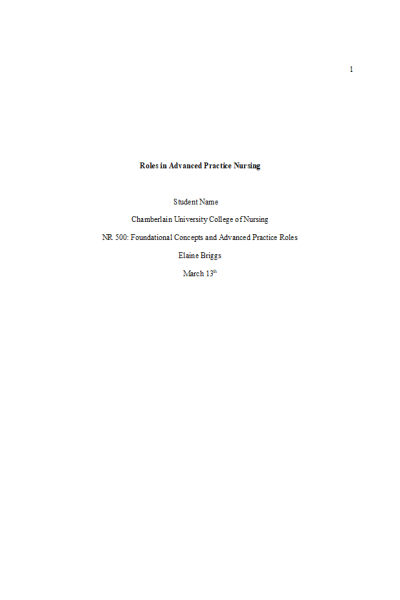NR 500 Week 2 Assignment; Assessment - Transition to Advanced Practice Role Paper
-
$20.00
| Institution | NR 500 Foundational Concepts and Applications |
| Contributor | SHEELA SHERPA |
Roles in Advanced Practice Nursing Student Name Chamberlain University College of Nursing NR 500: Foundational Concepts and Advanced Practice Roles Elaine Briggs March 13th Roles in Advanced Practice Nursing Historically, the white lab coat was symbolically linked to the medical doctor, however there are other clinicians who put on that revered attire. The Advanced Practice Nurse (APN) is among those honored with donning that long lab coat. The APN role was originally established to provide primary care to the pediatric population and those in medically underserved areas (DeNisco & Barker, 2015, p. 20). APN is an umbrella term that encompasses four disciplines including Certified Nurse Practitioner (CNP), Certified Nurse Midwife (CNM), Certified Registered Nurse Anesthetist (CRNA), and Clinical Nurse Specialist (CNS). The clinicians who fill these roles must make a transition from the caregiver Registered Nurse (RN) function to that of the provider APN in order to fully utilize their advanced knowledge and skills within the competencies of their profession. Four APN Roles The term Advanced Practice Nurse (APN) is generically used to describe a Registered Nurse who has obtained a master’s degree and delivers direct patient care (DeNisco & Barker, 2015, p. 5). The four capacities found within the APN designation are the Certified Nurse Practitioner (CNP), the Certified Nurse Midwife (CNM), the Certified Registered Nurse Anesthetist (CRNA), and the Clinical Nurse Specialist (CNS). All, with the exception of the CNS, require passing an examination to procure licensure that allows practice beyond that of the Registered Nurse license. All APNs are educated to at least a master’s degree level in order to be a provider capable of handling complex medical conditions through diagnosing, providing treatment, and prescribing medications (Winger et al., 2020, p. 205). A Clinical Nurse Specialist (CNS) is the only role that does not require the provider to take an exam after receiving their advanced education. The CNS role was initiated to fill a need for nurses who were capable of practicing advanced care in the psychiatric community (DeNisco & Barker, 2015, p. 7).
| Instituition / Term | |
| Term | Year 2022 |
| Institution | NR 500 Foundational Concepts and Applications |
| Contributor | SHEELA SHERPA |






































